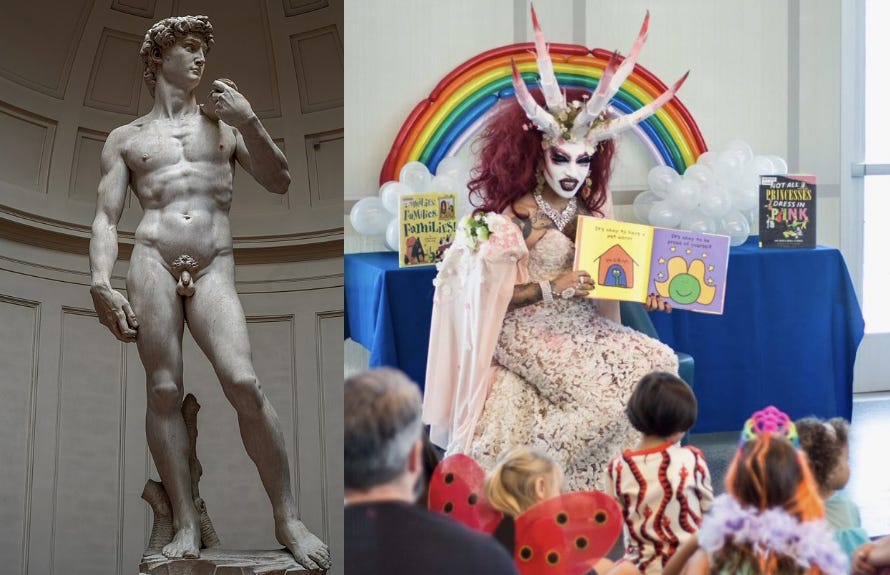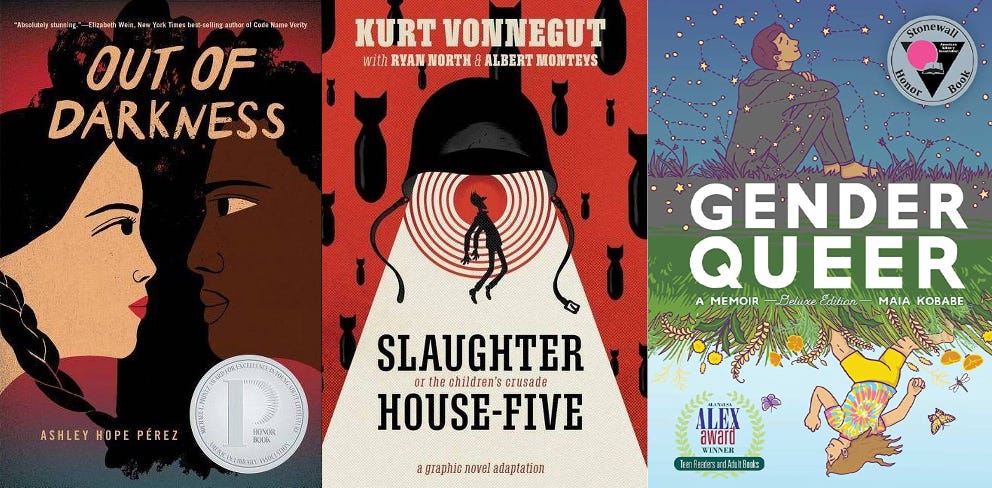Should We Ban Stupid Books Instead?
The empty calories of current year school literature as a proposed dividing line in the culture war, but could this be a blessing in disguise?
The aftermath of Gov. Ron Desantis’ “Don’t Say Gay Bill” resulted in Escambia County School District banning identity politics related books such as Ashley Hope Pérez’s “Out of Darkness” and “When Aidan Became a Brother” alongside the legendary Kurt Vonnegut’s “Slaughterhouse-Five”.
But there’s something wrong with this picture which has nothing to do with levels of sex and violence, but something much more substantial.
When placing Mr. Vonnegut in the same category as these contemporary authors, both sides of the argument approach literature like, to borrow a line from “Toy Story’s” Mr. Potato Head: “Uncultured Swine”.
I’m not making it a focus on the controversy of the aforementioned banned books as there are enough publications who do this, nor am I saying there should be a ban on the discussion of alternative lifestyles or racial dynamics at an age where families in their local district can agree it makes sense.
But what I want to address is the level of substance that children are exposed to which in my opinion (and also fact) transcends many of the surface issues that parents and government officials have with these books.
Most of the aforementioned group are normies that don’t know a thing about literature and given our educational system, I don’t expect them to.

Sorry to be a snob when it comes to school books but from personal experience, many of the sad excuses for stories I had to read in textbooks and write reports on were very boring and sub-standard. This was the equivalent of a restaurant’s children’s menu, almost like it was intentionally done to discourage all but the most compliant and mundane kids from falling in love with reading.
Items on the children’s menu are usually empty calories covered with chemicals to overload the senses. More than sex or violence, the currently dominant culture influencing young people is one of colorful emptiness, matching that of the oversaturated preschool “kid friendly” content that lazy parents prop in front of their toddlers as a dopamine drip.
While social justice oriented foundations prop up this newer identitarian literature today, the Newberry Medal winning books of my school days always felt like they too were part of some little mafia whose mission was to make money from wasting the time I could have spent on actually good books or staring at clouds.
These literary masterpieces like Betsy Byars’ “The Midnight Fox” or Ellen Conford’s “Dreams of Victory” were printed in the reading textbook itself, and from a “who benefits” perspective, it makes a lot of sense that these contemporary pieces would be selected.

Unlike classics that are often in the public domain and can be used freely, modern works are protected by copyright laws. This means that to include them in textbooks, publishers need to secure licenses from the authors or their estates and the original publishing houses.
This process inherently involves paying royalties, which becomes an income stream for the authors and publishers involved. Therefore, promoting the inclusion of these newer works in educational curricula becomes a financial incentive for authors and their publishers.
The mafia gains power while children throughout the land groan from boredom.
Reading a few of these newly banned school books, I immediately came across how uninspired they are and had a Vietnam flashback to 2nd grade. When you take away the queer, transgender, and racial themes, you are not left with much else.
And this lack of substance is perfect for appealing to surface level students who may good at memorizing and being obedient to the status quo.
Did the USSR do it better?
It may be partly thanks to the Soviet Union which I was born in (St. Petersburg to be precise) and lived till the age of four, that there was more of an emphasis on good literature growing up, but does this mean that at least in this case, the USSR is a good example to follow?
For all the problems in the Soviet Union compared to which those of the West are far behind, there was an emphasis on higher quality education regardless of your position in society, and a good portion of it was reflected in the school literature.
Expected commie propaganda aside, there were free after-school programs with books from renowned children’s authors such as Korney Chukovsky and Aleksey Tolstoy, whose stories did not have to be overly complex yet carried through a much deeper and layered understanding of the world because frankly speaking, these authors were actually intelligent and talented while the mafia of contemporary children’s authors are educated but dim-witted and ungifted.

But this is a double-edged sword. While the competency of soviet writers was much higher than what passes here in the U.S. today, the same goes for the effectiveness of their propaganda.
And even though most sane people would recognize some self-important blue haired academic or author as a joke, it would take a more nuanced eye to not fall for the seductive propaganda of someone who is actually brilliant at it, especially if we’re talking younger people.
One example of this from the USSR is Arkady Gaidar. In addition to being an acclaimed children’s author in the Soviet Union, Gaidar showed himself to be a just as talented in being a maniacal murderer for the state.
Gaidar’s bloodlust first showed itself in fighting for the Red Army against the White Army during the Russian Civil War, and afterwards when he murdered Kulaks (prosperous peasants persecuted by Stalin’s regime) under the orders of Soviet authorities.
A frequent narrative in Gaidar's work showcases the heroism of a young boy, aged between 10 and 14, fearlessly opposing enemies of the Soviet Union.
Though he is murdered, the boy’s martyrdom does not go unavenged, as the Red Army soldiers subsequently kill the “bad guys” and praise the name of this brave boy like the mothers of Hamas suicide bombers.
Other such brilliant authors include the Russian Futurist Vladimir Mayakovsky, who wrote propagandistic children’s poems for the Soviet Union as well as his equally brilliant contemporary Daniil Kharms.

These are just a few examples of the authors we know well enough today due to their outstanding qualities. However, there were many more propagandistic children's works in the past that have been forgotten, whose literary standards far surpass the current state of children's and young adult literature in America today.
But this higher quality propaganda is also the Venus Flytrap that I find many people who have fled from their woke indoctrination cages landing into.
When there’s a high level of silver-tongued competence by those who advocate for an authoritarian solution to our modern problems, they are seen as an intellectual paragon when compared to the dumb professors that call for defunding the police and reparations.
The need to fit in ends up being too strong and referencing Plato, Aristotle, The Roman Empire, Oswald Spengler, and God knows what else, gives an impression of a high intellectual pedigree, but one that ends up forming its own little mafia as well.
As a friend of mine described those in the reactionary “Fly-Trap”:
“I think a lot of these people are just creative/artistic souls who feel there is no place for them anywhere else due to woke possession of even the most historically bohemian/curious arenas.”
So in a way, the status quo may be much better than if a top-down power had really smart (but evil) people coming up with literature that would justify their new status quo, as fewer people would be intellectually equipped to deal with it, especially those who consider themselves to be intellectuals.

The kids and parents who already have a good bullshit detector may already recognize something lacking in their education. Since we have seen a 30% increase in Homeschool enrollment post-pandemic, there is ripe ground for the intellectual cream to rise to the top as far as what books end up being read.
This is not to say that when it comes to certain sexual, racial, and gender issues, parents should not be privy to and have a say in preventing left leaning activism on these subjects from taking hold.
The nuance is in making sure that families who are not part of the collective blob of either political persuasion are not forced into submitting to whoever thinks themselves smart enough to tell them what they are or aren’t allowed to read.
In this way, the social justice class at least makes it very clear how much they embody the village idiot aesthetic so that it's easy to steer clear of them. Not so much for those who share in the problems most common sense people have identified but prescribe a cure worse than the disease.
So in the end, our current situation may be a blessing in disguise if the rejection of what are mediocre at best literature can inspire a pushback of quality as opposed to ideology.



> Though he is murdered, the boy’s martyrdom does not go unavenged, as the Red Army soldiers subsequently kill the “bad guys” and praise the name of this brave boy like the mothers of Hamas suicide bombers.
I’m not sure why this is an example of something uniquely bad about Soviet literature. All martial societies (all societies) will necessarily vaporize real or fictional child soldiers who fought valiantly for them. How else will kids grow up to fight in the military? Even if there’s conscription you need to motivate future soldiers. This argument seems weirdly pacifist.
Overall bothsides are terrible, I do agree with that general thrust
The banning of "identity politics" books and works of art is done in such a low IQ, brutish way for one, simple reason.
Conservative dishonesty and severe, terminal levels of cowardice.
A honest right winger would demand that some of these books are taken out of education (and the shelves in general) as they promote degenerate lifestyles and normalize queerness. In the case of the racial ones, the same honest person would argue that the US has grown to be as it was in it's prime because of whiteness prevailing, or white primacy if you want. Any attempt to grow a racial identity in minority groups is obviously destabilizing and creating racial and ethnic strife, which is undesirable. In nation states that know their past, history etc., there is an ethnic group at the core, often imperfectly defined. Its behaviors are mainstreamed. Minority behaviors are not normalized and frowned upon.
But, we do not have honest conservatives, we have liars.